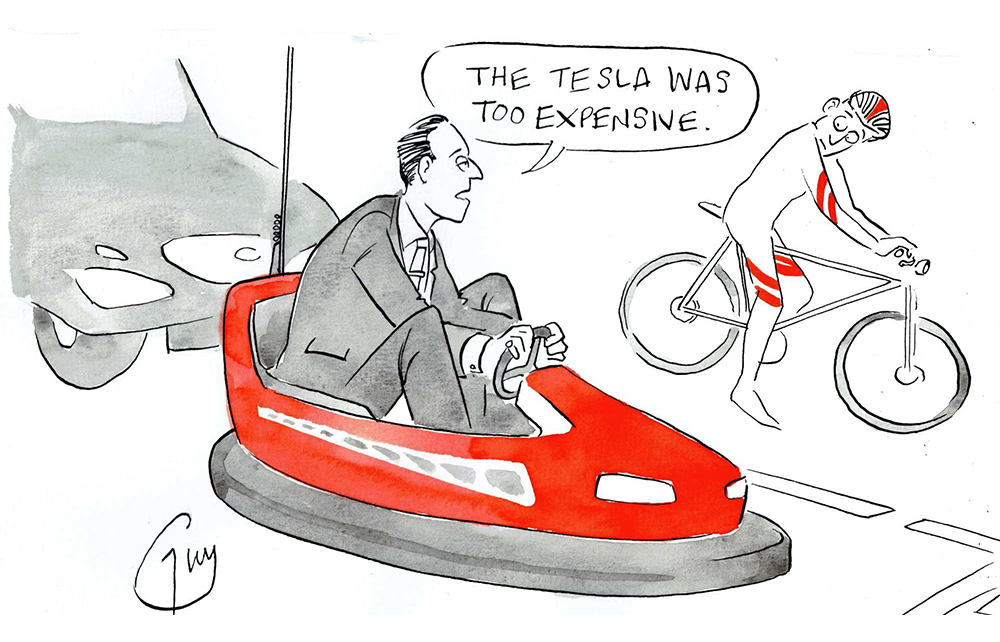A couple of years ago I thought seriously about buying an electric car. Not a hybrid, but the full monty. There was one in particular I liked the look of and I even contacted a dealership to ask whether they’d accept my diesel-powered VW Touran in part-exchange. The answer was yes, but it was still eye-wateringly expensive. Was it worth it? I tried to persuade myself it would be, given the savings on fuel costs, the waiving of the congestion charge, etc.
Boy, am I glad I dodged that bullet. Scarcely a day passes without a new horror story about electric vehicles in the press. Over the past week alone, we’ve learnt that some popular models are depreciating at twice the rate of petrol cars, that the number of free electric chargers on Britain’s roads has dropped by 40 per cent in the past 12 months, and that the sheer weight of their batteries means these cars could be banned from bridges and multi-storey car parks. It’s carmageddon!
Politicians have pledged to wean us off oil and gas without any serious plan for how to replace them
The model I was eyeing up supposedly had a range of 275 miles, which meant I could drive to any QPR away game on a single charge. The northernmost club in the Championship is Sunderland, which is exactly 275 miles from my house in Acton. But we now know that the manufacturers’ range estimates are wildly optimistic. For instance, Giles Coren was told his Jaguar I-Pace, which he bought in 2020, had a range of up to 292 miles, when the reality was 220. Being a Hoops fan like me, that’s one of the reasons he’s ditched it. I cannot imagine the frustration of desperately searching for a rapid charging point as a succession of warning lights comes up on the dash, with 70 miles to go and kick-off less than two hours away.
But what would have really annoyed me is the feeling I’d been sold a pup by a government keen to burnish its green credentials. OK, I might have got in under the wire for the plug-in grant of £1,500 – the government scrapped that on 15 June last year – but what about the exemption from road tax I’d been promised? Jeremy Hunt announced in the Autumn Statement that electric car owners will have to start paying vehicle excise duty from 2025.
Then there’s the fact that electricity costs have increased by 66.7 per cent in the past 12 months, wiping out most of the savings I would have been banking on. That may not be entirely the government’s fault, but failing to invest in nuclear, banning fracking and inflating energy bills with green subsidies hasn’t helped.
Perhaps the biggest betrayal, though, has been the failure to invest in the necessary frameworks to make electric cars viable. In March 2022, the government’s EV Infrastructure Strategy estimated that the UK would need between 280,000 and 720,000 charging points by 2030 and set a target of 300,000. But to meet that, 100 new chargers would need to be installed daily, whereas the current number is around 23, according to the Society of Motor Manufacturers and Traders. The situation is already dire, with EV owners reporting that two out of three roadside chargers are busy or broken, and this will only get worse as the number of new electric cars on our roads grows. In March, 46,626 new EVs were registered – a record high – but only 713 new chargers were installed.
In light of these failings, it beggars belief that the government is still proposing to ban sales of new petrol and diesel cars by 2030. Even the EU isn’t proposing to do it before 2035, but Boris Johnson’s administration decided to bring that target forward, thereby putting the UK on course to be the fastest G7 country to decarbonise cars and vans. Announcing this major change without putting the proper investment in place – as if environmental policies don’t come with a massive cost – is typical of the headlong rush towards net zero.
A recent report by the Global Warming Policy Foundation estimated that the cost of replacing natural gas back-up in Germany with large battery storage facilities – necessary because wind and solar power are so intermittent – ‘is a multi-trillion dollar project, likely costing a multiple of the country’s GDP, and thus completely infeasible’. The claim often made by western governments that policies like the phasing out of ‘wet’ vehicles will spearhead a ‘green economic recovery’, which will boost GDP and create millions of jobs, is for the birds. The truth is that virtue-signalling politicians have pledged to wean us off oil and gas without any serious plan for what to replace them with.
I’m glad I never fell for the electric car boondoggle, but I won’t be feeling smug for long. In most areas of life, we have no choice but to accept green policies, even when we know they’re going to cost us an arm and a leg.





Comments